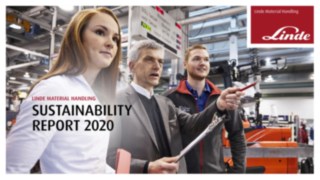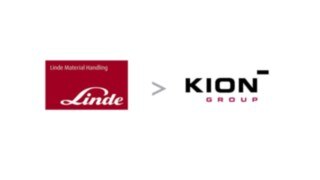
Status quo and targets made transparent
13 Jul 2021
Linde MH presents Sustainability Report 2020
The Aschaffenburg, Germany based intralogistics specialist Linde Material Handling (Linde MH) has released its sustainability report for 2020. It takes stock of major social, ecological and economic aspects of the company’s activities and sets out specific targets for the future. Sustainability is firmly anchored in the company’s corporate strategy. Going forward, regular updates will continue to be published to document the progress being made.
“At Linde Material Handling, we are convinced that sustainability has become a crucial factor,” says Stefan Prokosch, Senior Vice President Brand Management at Linde MH. “In this regard, we focus both on our own sustainable business practices and on the products and solutions we manufacture.” The intralogistics company aims to be a responsible and reliable partner to its customers in helping them achieve their own sustainability goals by means of innovative technologies. The sustainability report summarizes the status quo as well as company objectives for the coming years and is based on the international standards for sustainability reporting set out by the Global Reporting Initiative (GRI). It is initially available for download as an English version PDF on Linde MH's website.
Linde MH has been reporting on its own activities since 2014 and has presented a comprehensive set of guidelines within its current publication: The main section, covering corporate organization and strategy, employer profile, employees, health, safety and environment, products and supply chains, and social responsibility, is followed by a detailed appendix with tables of relevant key performance indicators. There is a clear commitment to sustainable business practices, and this goal, together with customer satisfaction and profitable growth, forms a triad within the 2027 corporate strategy. “For us, sustainability has become a measure of success because it secures our company’s future viability,” explains Hans-Georg Connor, Director Health, Safety & Environment at Linde MH. Specific goals have been defined to achieve this, including an EcoVadis rating of at least 75 points by 2027, a five percent reduction in reportable accidents annually, certification of all company sites according to ISO 14001 and ISO 45001 by 2024, and an average illness rate of no more than 3.3 percent for 2021.
In its report, Linde MH recognizes its employees as a cornerstone of success. Offering career opportunities and advanced training programs as well as an environment that fosters teamwork, the international company presents itself as an attractive employer who has maintained its strong commitment to training even during the two years of the coronavirus pandemic. In the year under review, the company employed 334 apprentices training in 14 occupations all over Europe and 30 students pursuing ten for-credit dual-course college programs in Germany.

The sustainability report for 2020 from Linde Material Handling takes stock of major social, ecological and economic aspects of the company’s activities and sets out specific targets for the future.

The sustainability report for 2020 from Linde Material Handling takes stock of major social, ecological and economic aspects of the company’s activities and sets out specific targets for the future.
A further chapter is devoted to Health, Safety and Environment (HSE). It lists measures and targets designed to maintain the health of employees and prevent accidents wherever possible. The same applies to the area of environmental protection: An initial milestone is to reduce energy-related greenhouse gases by 30 percent by 2027, with the CO2 footprint generated in production, sales and services in 2017 serving as the basis. Some progress toward this goal has already been achieved: Around 79 percent of the electricity purchased in 2020 came from renewable energy sources.
The 57-page report devotes ample consideration to the contribution that Linde MH is making to greater sustainability with its products and solutions. Brand Manager Stefan Prokosch explains why the focus is primarily on the products’ use phase: “As we know from our life cycle assessments, this is where the greatest leverage for climate protection is to be found. And with the new generation of Linde electric forklifts, we are creating another prerequisite for achieving CO2 neutrality in the long term.” In general, the topic of energy plays an important role for Linde MH. “We want to be energy consultants for our customers and deliver the best possible solution for every application. To enable us to do this, we have the broadest range of energy options available,” Prokosch continues. “When it comes to recycling lithium-ion batteries, a viable solution already exists. The recycling of cells remains a challenge, however – the recycling rate is still low today.” Here, the company is working closely with battery manufacturers.
With its numerous safety solutions, Linde MH also offers a holistic concept for improving safety in intralogistics. In addition to sensor- and ultra-wideband-based assistance systems, this includes safety consulting that can be used to identify and mitigate safety-critical points in operations. Last, but not least, the high product quality of the company’s industrial trucks also contributes to the responsible use of resources.
Linde Material Handling’s principles relating to supplier behavior are becoming increasingly important. They set out the clear expectation that human rights will be respected and international social standards complied with. In particular, these include the prohibition of child labor and forced labor in accordance with the requirements of the International Labor Organization (ILO), as well as the enforcement of statutory minimum, health and safety standards. In order to achieve the greatest possible transparency with regard to the sustainability of Linde MH’s supply chain, an EcoVadis rating or a comparable assessment is to be available for 25 percent of top-spend strategic suppliers by 2022, 100 percent of strategic and high-risk suppliers by 2023 and 100 percent of direct suppliers by 2025. Moreover, minimum requirements for sustainability in the supply chain are to be defined and communicated by 2023, and from 2027 they will become mandatory for all suppliers.

